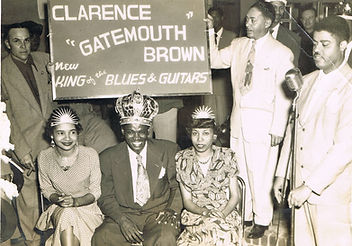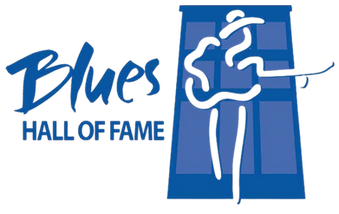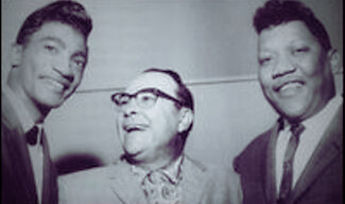
ABOUT
November 1, 1903
Don Deadric Robey is born in Houston, TX. He was the son of a Black father and a Jewish mother.
Late 1910s-Early 1920s
Don Robey got married to Beatrice Emily Sherman Robey and together they had a son, Louis Robey.
Late 1910s-Early 1920s
He worked for a taxi service and eventually became a manager.
1933
After returning to Texas, he opened the Sweet Dreams Cafe in the Fifth Ward of Houston.
1934
As a budding entrepreneur, Don Robey opened various restaurants and nightclubs in Houston, including the Lenox Club.
1940s
Robey opened a Record Store in the Fifth Ward.
1942
Robey’s promotion of Louis Jordan and the Tympany Five in the South helped catapult Jordan’s career and become arguably the most successful and influential artist of the decade.
1949
Robey continued his success in entertainment by opening Peacock Records, one of the first Black-owned record labels in the United States. Clarence “Gatemouth” Brown was the first artist to sign with Peacock Records. Over the years, Robey signed many successful artists to the label such as Memphis Slim, Marie Adams, Floyd Dixon, The Dixie Hummingbirds, The Mightly Clouds of Joy, The Five Blind Boys and Willie Mae “Big Mama” Thornton.
.png)
1952
Soon after joining Duke, Don Robey’s influence propelled artist Johnny Ace’s “My Song” to a #1 Hit.
1957
Back Beat Records, a subsidiary label to Duke Records, was formed and included Soul recording artists such as Joe Hinton, O.V. Wright, and Carl Carlton.
Early 1960s
Don Robey married his third and final wife, Murphy Robey and they had three children - Don Robey, Jr., Errol Robey, and Althea Robey.
Early 1960s
Robey started his fourth record label, Sure-Shot Records, with pistols on the logo emblematic of the pistols he carried on his person, in his cars, in his office, and in his home.
1963
Robey founded Song Bird Records, a second gospel label.
1973
After decades of success in the Music Industry as the first Black Record Mogul, Robey sold all five of his record labels and around 1,500 publishing assets (songs he either wrote, co-wrote, or purchased the rights from songwriters) to ABC/Dunhill and was a consultant for the catalog until his death.
2014
Don Robey was inducted into the Blues Hall of Fame.


June 16, 1975
Don Deadric Robey died of a heart attack in Houston, TX at age 71. He was survived by his wife, 6 children, 3 sisters, and many grandchildren.
April 16, 2011
A Texas Historical Marker was placed at the original location of Peacock Records on Lyons Avenue in the Fifth Ward in Houston, TX, by the Harris County Historical Commission. The ceremony was attending by his widow and some of his children and grandchildren.

Present Day
Don Robey's legacy lives on as his songs have been covered by hundreds of artists, are streamed millions of times per year, and are played in live concerts all around the World.


1947
Robey, Merritt, and business manager Evelyn Johnson started the Buffalo Booking Agency, where they signed their first client, Clarence “Gatemouth” Brown.
1945
Don Robey opened the upscale Bronze Peacock Dinner Club, which became a major entertainment hub for Black performers and successful Black professionals from Houston and the surrounding areas.

.png)

1936
Robey partnered with Morris Merrit and decided to rename the Sweet Dreams Cafe to the Harlem Grill. Robey began to expand his entertainment empire by regularly booking the country’s top Black artists, including Duke Ellington and Ella Fitzgerald. Via his connections with popular artists and owning the Harlem Grill, Robey was instrumental in establishing Houston, TX, as an important stop on the renowned Chitlin Circuit.


1952
Don Robey formed a partnership with Memphis-based record label Duke Records. The following year he acquired the label and merged it with Peacock Records. Don Robey closed his Bronze Peacock Club in Houston and used the space as the headquarters of Duke-Peacock Records. Because of the acquisition of Duke Records, Don Robey had the opportunity to work with recording artists such as Johnny Ace, Little Junior Parker, Rosco Gordon and Bobby “Blue” Bland (Robey’s most consistently successful artist with thirty-six Billboard R&B Hits).
Late 1920s-Early 1930s
Don Robey marries his second wife, Naomi Parks Robey. They had two children - Dona Leah Robey and Naomi Robey.
Late 1920s-Early 1930s
He moved to Los Angeles, CA for 3 years and operated the Harlem Grill.

1910s
In his youth, Robey worked on cotton farms with his mother. As a teenager, he worked at the Galveston Port before dropping out of High School to become a professional gambler.

1953
Peacock Records artist Willie Mae “Big Mama” Thornton’s song “Hound Dog” became a #1 Hit.
1953
Johnny Ace landed his second #1 Hit as a Duke Records artist for his song “The Clock.”
.png)
.png)
.png)
1955
As a result of a tragic accident, recording artist Johnny Ace lost his life. Ace’s untimely death was nationally publicized. Soon after, Robey’s song “Pledging My Love” became Johnny Ace’s final #1 Hit.
1957
Bobby “Blue” Bland’s songs “Farther Up The Road” and “I Pity The Fool” both became songwriting #1 Hits for Don Robey.
.png)



1950s-1960s
When he had the chance to break away from his growing business in the entertainment industry, Robey enjoyed fishing, hunting, and riding horses on his cattle ranch.
.png)
1963
Don Robey charts his fourth songwriting #1 Hit for “That’s The Way Love Is” recorded by Bobby Bland.

